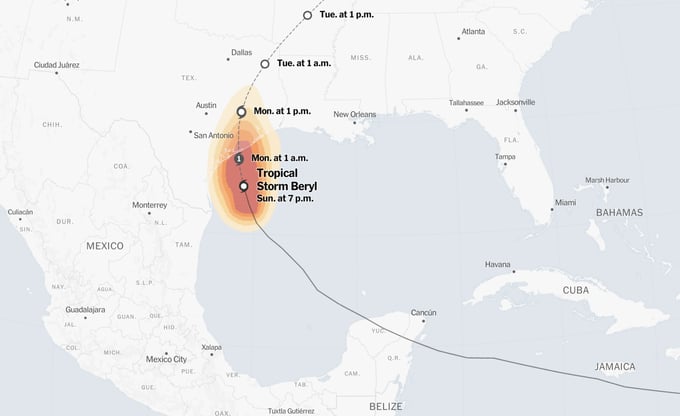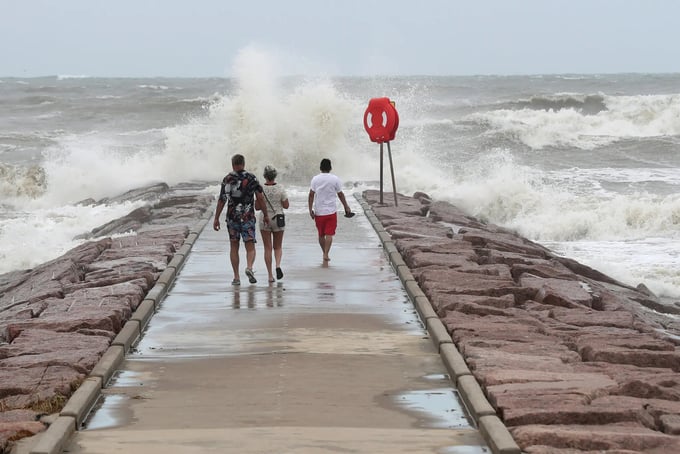December 31, 2025 | 01:00 GMT +7
December 31, 2025 | 01:00 GMT +7
Hotline: 0913.378.918
December 31, 2025 | 01:00 GMT +7
Hotline: 0913.378.918

The path of Tropical Storm Beryl. Source: US National Hurricane Center.
Hurricane Berylis expected to make landfall in Texas early on July 8 (local time) as a Category 1 storm. Previously, Beryl reached Category 5 while passing through Jamaica Bay, causing severe damage in the Caribbean and resulting in at least 11 fatalities.
Coastal Texas municipalities have issued evacuation notices, warning over 1 million residents of the storm’s potential impact. Forecasts indicate that Beryl could regain strength before making landfall, bringing heavy winds and rain. The storm is expected to continue producing heavy rain and strong winds.
According to the U.S. National Hurricane Center, Hurricane Beryl had maximum sustained winds of 65 mph (104 km/h) as it crossed the Gulf of Mexico early on July 7. The storm could cause damaging winds, life-threatening flooding, and storm surges, with storm surges reaching up to 16 inches (40 cm) and heavy rain affecting southern and central Texas coastal areas.
The Texas state disaster agencies have issued disaster declarations for 121 counties, allowing state resources to support local preparedness and recovery efforts. The Texas Division of Emergency Management is prepared to activate the National Guard, search and rescue teams, and other emergency services in anticipation of the storm.

Texas authorities have issued warnings of high winds and high surf. Photo: Jennifer Reynolds/The Galveston County Daily News.
Across the border of Texas, residents of the northern Mexican state of Tamaulipas were relieved to learn that Beryl would only bring moderate to heavy rainfall in some areas. However, authorities remained vigilant, urging residents not to be complacent.
Earlier in the week, officials in Tamaulipas set up temporary shelters, inspected dams, identified landslide-prone areas, and implemented flood prevention measures. They also closed roads, cleared drainage systems, and trimmed trees.
According to Tamaulipas' government secretary, the rains are a blessing for the state, as drought had dried up dams. Additionally, the lagoon system that supplies water to thousands of local residents has been restored.
(The New York Times)

(VAN) From emissions cuts to energy sovereignty, France’s president reflects on COP21's legacy.

(VAN) A Yale University poll from earlier this month says most Americans see climate change as playing a role in hurting prices and the cost of living.

(VAN) According to the National Food and Strategic Reserves Administration, this year's autumn grain entered the market earlier and boasts good quality.

(VAN) The Trade Policy and Strategy Office (TPSO) under the Commerce Ministry reported that exports in November 2025 were worth US$27.445 billion, expanding for a 17th consecutive month at 7.1%.

(VAN) Ukraine’s leading poultry processor and exporter, MHP, plans to kick off a trial production of insect meal in the first quarter of 2026, as revealed by Serhiy Melnychuk, scientific advisor to the chairman of MHP.

(VAN) Researchers have warned of the unexpected consequences of extremely hot, humid conditions during pregnancy.

(VAN) A group of Iranian scientists from the National Institute of Genetic Engineering and Biotechnology claimed that they have developed a technology that allows effective processing of poultry feathers into meal using a Bacillus strain.